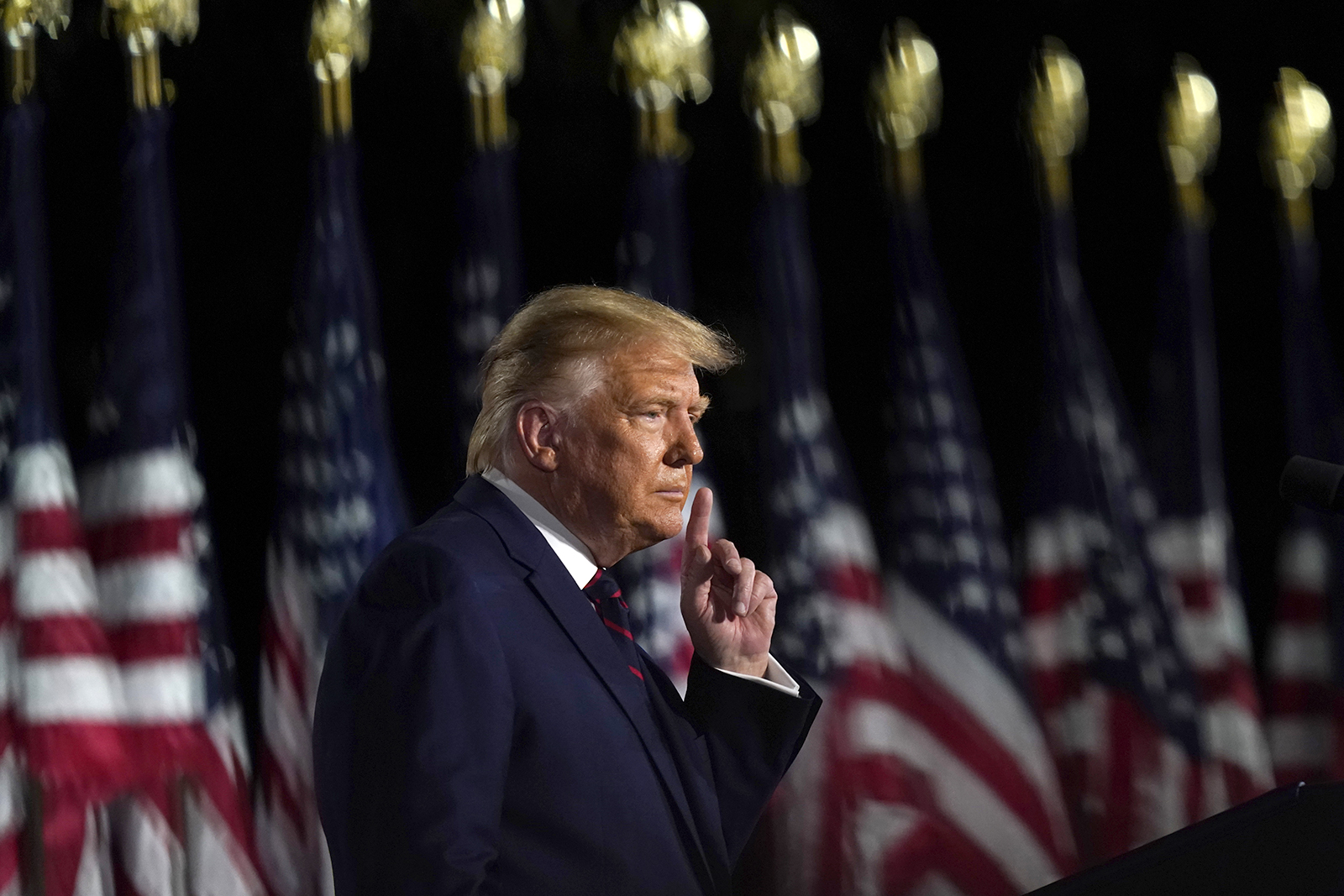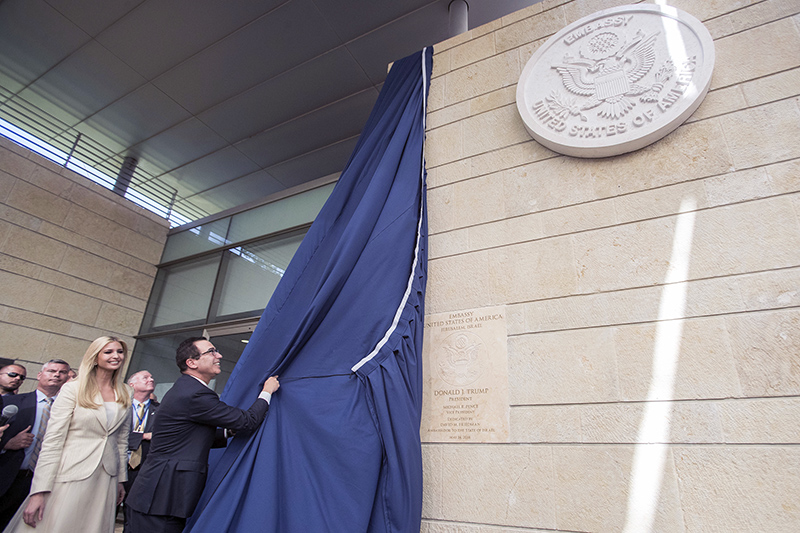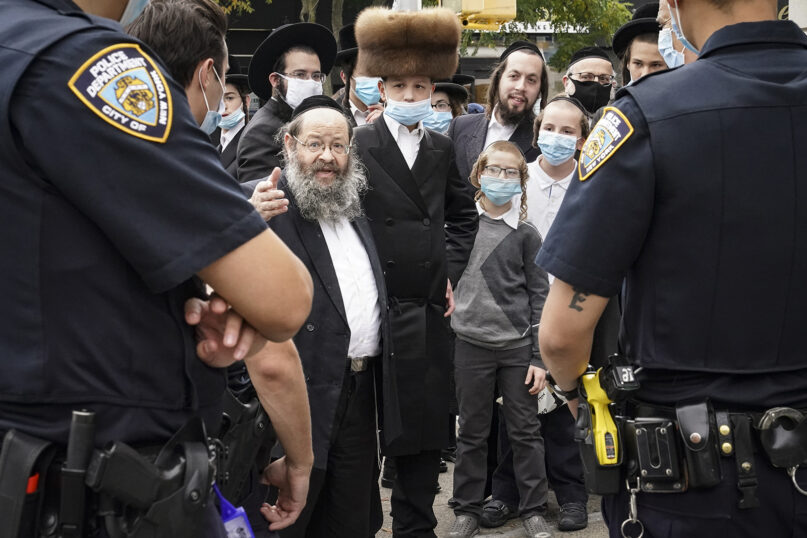(RNS) — Continuing a pattern of Democratic support almost a century old, the majority of American Jews are expected to cast a ballot for Joe Biden in this election. Indeed, a recent poll by the American Jewish Committee put overall Jewish support for the former vice president at 75%.
But that same survey highlighted a political split in American Jewry: While most Jewish Americans are backing the Democratic candidate, Orthodox Jews are overwhelmingly backing Donald Trump. Almost 74% of Orthodox respondents to the Oct. 19 poll said they will cast their ballot for Trump. This is reflected not only in voting intention but in a series of “Jews for Trump” rallies in the weeks leading up to the Nov. 3 close of polls.
Voting for Donald Trump, however, or even rallying for him, doesn’t equate to liking him.
Over the years, scholars have suggested that American Jews tend to vote for Democrats due to their social minority status, their liberal religious and social views, and their support for church-state separation. Much less attention has been given to Jewish conservatives and GOP supporters beyond the statistics that surveys yield.
RELATED: In battleground states, American Jews prefer Biden over Trump by a wide margin
As scholars of contemporary American Jewry, we were curious to learn more about the political views of Orthodox Jews. Between Aug. 15 and Oct. 2, 2020, we interviewed 36 lower-income Jewish parents with at least one school-aged child. Fourteen of them identified as Orthodox and most were strictly observant. Almost all lived in the Rhawnhurst neighborhood in Northeast Philadelphia.

President Donald Trump speaks from the South Lawn of the White House on the fourth day of the Republican National Convention, Thursday, Aug. 27, 2020, in Washington. (AP Photo/Alex Brandon)
Although the sample size is small, the responses offered important insights into the political thinking of Orthodox Jews.
All but one of the Orthodox respondents said they plan to vote for Trump. This overwhelming support for Trump wasn’t a surprise, since it aligns with the recent AJC survey. What did come as a surprise was that almost none of the people voting for Trump were comfortable about it, never mind enthusiastic. Not one of the respondents spoke favorably of Trump, and they are supporting him only begrudgingly.
One woman, a single mother of a teenager, told us: “I hate Trump. I mean, I think he’s just an abomination. Abysmal as a leader. Biden is a competent politician, even though he is a Democrat … but I surely won’t vote for him.”
Other interviewees expressed similar if somewhat less colorful sentiments. “I will probably end up voting for Trump, but it’s certainly not out of respect for him as a person,” said one mother of four, adding: “It would be out of respect for some of his policies or the policies that I can’t handle on the other side.”
One father, who had moved from Brooklyn to Philadelphia, compared Trump to unsavory television characters: “I will vote for him, but I don’t like him. He kind of reminds me of that popular kid in those teenage sitcoms where you have the prom queen and king — no one really likes them, but somehow, they always get their way.”
So what are the policies that Orthodox Jews care so much about that they are willing to vote for a person they don’t like? High on the list are what respondents identified as religious liberties — things like conducting public menorah lightings, the right to refuse services to same-sex couples and tax credits for religious schools.
Our respondents viewed Republican policies as much more friendly toward religious liberties, and they tie Republican Supreme Court nominations to these issues as well. Like many conservative Christians, the respondents in the survey described themselves as pro-life and pro-family. One woman who became religious in adulthood said that she also became anti-abortion: “That’s a person in there,” she emphasized and cited it as a key reason for being politically on the right.

U.S. President Trump’s daughter Ivanka, left, and U.S. Treasury Secretary Steve Mnuchin unveil a plaque during the opening ceremony of the new U.S. embassy in Jerusalem, on May 14, 2018. Amid deadly clashes along the Israeli-Palestinian border, President Trump’s top aides and supporters on Monday celebrated the opening of the new U.S. Embassy in Jerusalem as a campaign promise fulfilled. (Flash90 Photo/Yonatan Sindel via AP)
And then there’s Israel. People we spoke with overwhelmingly thought Trump had done a great job with his policies toward Israel. People were especially approving of Trump’s decision to move the U.S. embassy to Jerusalem. We heard statements such as: “He has supported a pro-Israel dialog,” and, “He’s certainly been very good for Israel while the Democratic Party is a disaster for Israel.”
On the other side of the equation, many are repelled by liberal and progressive cultural attitudes they associate with Democrats.
One woman, who describes her family as “a staunch right-wing Republican family,” said her decision to vote for Trump comes down to her disdain for the left: “The liberal left wing factions have destroyed the country, destroyed the American family. They have destroyed what I see as the fabric of society.” She said she was concerned by issues such as the obsession with gender-neutral pronouns, all-gender bathrooms and “men kissing men.”
In her view, these are liberal issues that affect a tiny fraction of the U.S. population, and they should be private matters.
Many respondents felt unsettled by the civil unrest in Philadelphia this summer and were unsympathetic to the Black Lives Matter protesters, whom they associate with Democrats.
Biden has appealed to voters to look at character as well as policy when they head to the polls. In the final presidential debate on Oct. 22, he implored: “You know his character. You know my character.”
But for those we interviewed, it’s simply not about the character of the person at the top of the ticket — it’s about policies and positions that have come to define America’s cultural divide.
(Ilana M. Horwitz is a postdoctoral fellow at Stanford University. Laurence Kotler-Berkowitz is a Jewish communal researcher and political scientist. The views expressed in this commentary do not necessarily reflect those of Religion News Service.)





